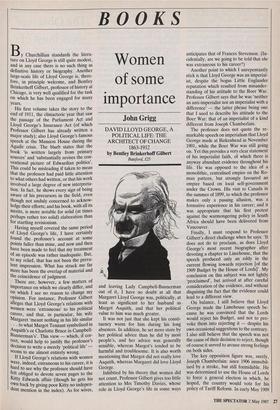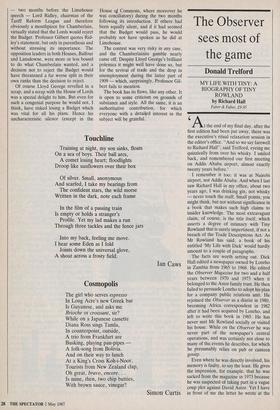BOOKS
Women of some importance
John Grigg DAVID LLOYD GEORGE, A POLITICAL LIFE: THE ARCHITECT OF CHANGE 1863-1912 by Bentley Brinkerhoff Gilbert Botsford, f25 By Churchillian standards the litera- ture on Lloyd George is still quite modest, and in any case there is no such thing as definitive history or biography. Another large-scale life of Lloyd George is, there- fore, in principle welcome, and Bentley Brinkerhoff Gilbert, professor of history at Chicago, is very well qualified for the task on which he has been engaged for many years.
His first volume takes the story to the end of 1911, the climacteric year that saw the passage of the Parliament Act and Lloyd George's Insurance Act (of which Professor Gilbert has already written a major study); also Lloyd George's famous speech at the Mansion House during the Agadir crisis. The blurb states that the book 'is written largely from primary sources' and 'substantially revises the con- ventional picture of Edwardian politics'. This could be misleading if taken to mean that the professor had paid little attention to what others had written, or that his work involved a large degree of new interpreta- tion. In fact, he shows every sign of being aware of his precursors in the field, even though not unduly concerned to acknow- ledge their efforts; and his book, with all its merits, is more notable for solid (at times perhaps rather too solid) elaboration than for startling revisionism. Having myself covered the same period of Lloyd George's life, I have certainly found the professor's account at some points fuller than mine, and now and then have been made to feel that my treatment of an episode was rather inadequate. But, to my relief, that has not been the preva- lent impression. What has struck me far more has been the overlap of material and the coincidence of judgment. There are, however, a few matters of importance on which we clearly differ, and on which I see no reason to change my opinion. For instance, Professor Gilbert alleges that Lloyd George's relations with women were `extraneous' to his political career, and that, in particular, his wife Margaret 'meant nothing in his life similar • • . to what Margot Tennant symbolised in Asquith's or Charlotte Bruce in Campbell- Bannerman's'. This view — which, if cor- rect, would help to justify the professor's decision to write a merely 'political life' Seems to me almost entirely wrong. If Lloyd George's relations with women were, indeed, extraneous to his career, it is hard to see why the professor should have felt obliged to devote seven pages to the Kitty Edwards affair (though he gets his own back by giving poor Kitty no indepen- dent mention in the index). As for wives, and leaving Lady Campbell-Bannerman out of it, I have no doubt at all that Margaret Lloyd George was, politically, at least as significant to her husband as Margot Asquith, and that her political value to him was much greater.
It was not just that she kept his consti- tuency warm for him during his long absences. In addition, he set more store by her political advice than he did by most people's, and her advice was generally sensible, whereas Margot's tended to be harmful and troublesome. It is also worth mentioning that Margot did not really love Asquith, whereas Margaret did love Lloyd George.
Inhibited by his theory that women did not count, Professor Gilbert gives too little attention to Mrs Timothy Davies, whose role in Lloyd George's life in some ways anticipates that of Frances Stevenson. (In- cidentally, are we going to be told that she was extraneous to his career?) Another point to which I unrepentantly stick is that Lloyd George was an imperial- ist, despite the bogus Little Englander reputation which resulted from misunder- standing of his attitude to the Boer War. Professor Gilbert says that he was 'neither an anti-imperialist nor an imperialist with a difference' — the latter phrase being one that I used to describe his attitude to the Boer War: that of an imperialist of a kind different from Joseph Chamberlain.
The professor does not quote the re- markable speech on imperialism that Lloyd George made at Birkenhead in November 1901, while the Boer War was still going on. Yet this provides a very clear statement of his imperialist faith, of which there is anyway abundant evidence throughout his life. He was opposed to the idea of a monolithic, centralised empire on the Ro- man pattern, but strongly favoured an empire based on local self-government under the Crown. His visit to Canada in the summer of 1899, to which the professor makes only a passing allusion, was a formative experience in his career; and it was appropriate that his first protest against the warmongering policy in South Africa should have been delivered from Vancouver.
Finally, I must respond to Professor Gilbert's direct challenge when he says: 'It does not do to proclaim, as does Lloyd George's most recent biographer after devoting a chapter to Limehouse, that the speech produced only an eddy in the current flowing towards rejection [of the 1909 Budget by the House of Lords]'. My conclusion on this subject was not lightly `proclaimed', but arrived at after careful consideration of the evidence, and without disguising the fact that the evidence could lead to a different view.
On balance, I still believe that Lloyd George made the Limehouse speech be- cause he was convinced that the Lords would reject his Budget, and not to pro- voke them into rejecting it — despite his own occasional suggestions to the contrary. I also still believe that the speech was not the cause of their decision to reject, though of course it served to arouse strong feelings on both sides.
The key opposition figure was, surely, Joseph Chamberlain: since 1906 inunobil- ised by a stroke, but still formidable. He was determined to use the House of Lords to force a general election in which, he hoped, the country would vote for his policy of Tariff Reform. In early May 1909 — two months before the Limehouse speech — Lord Ridley, chairman of the Tariff Reform League and therefore obviously a mouthpiece for Chamberlain, virtually stated that the Lords would reject the Budget. Professor Gilbert quotes Rid- ley's statement, but only in parenthesis and without stressing its importance. The opposition leaders in both Houses, Balfour and Lansdowne, were more or less bound to do what Chamberlain wanted, and a decision not to reject the Budget would have threatened a far worse split in their own ranks than the decision to reject.
Of course Lloyd George revelled in a scrap, and a scrap with the House of Lords was a special delight to him. But even for such a congenial purpose he would not, I think, have risked losing a Budget which was vital for all his plans. Hence his uncharacteristic silence (except in the House qf. Commons, where moreover he was conciliatory) during the two months following its introduction. If others had been equally silent, and if it had seemed that the Budget would pass, he would probably not have spoken as he did at Limehouse.
The contest was very risky in any case, and the Chamberlainite gamble nearly came off. Despite Lloyd George's brilliant polemics it might well have done so, but for the revival of trade and the drop in unemployment during the latter part of 1909 — which, surprisingly, Professor Gil- bert fails to mention.
The book has its flaws, like any other. It is open to some criticism on grounds of substance and style. All the same, it is an authoritative contribution, for which everyone with a detailed interest in the subject will be grateful.



















































 Previous page
Previous page